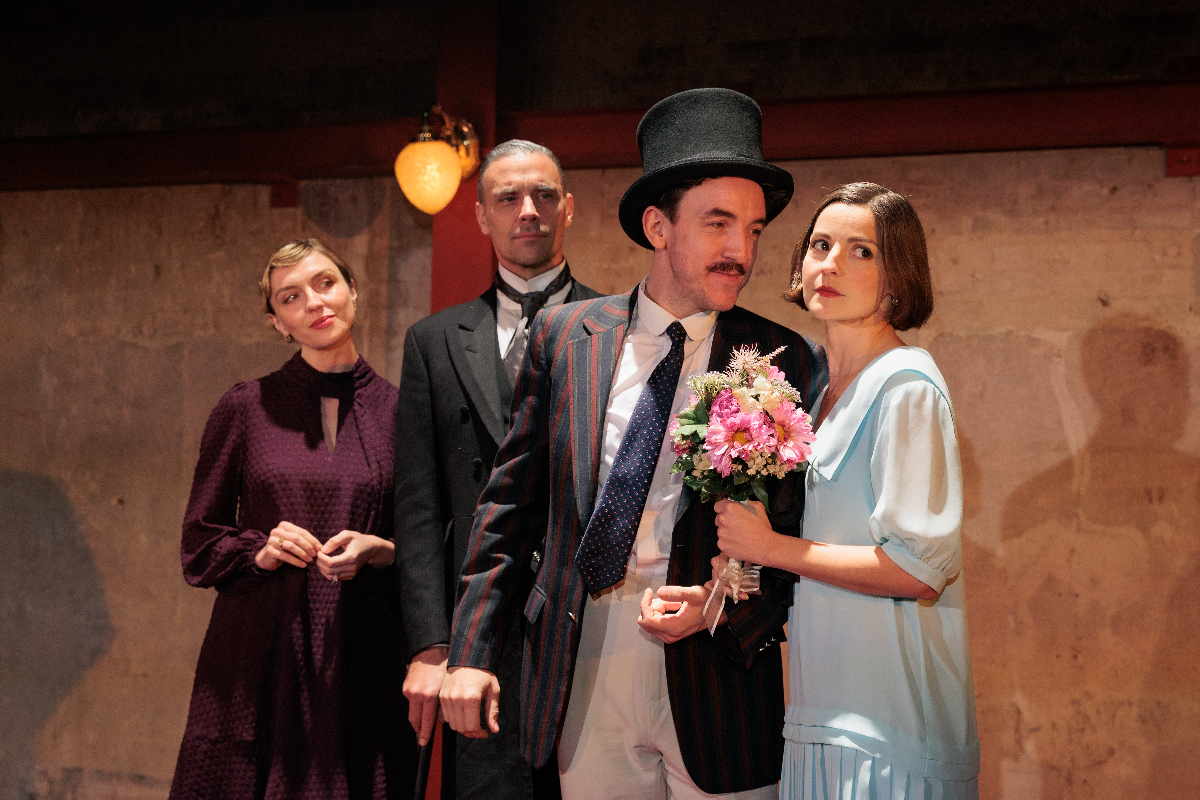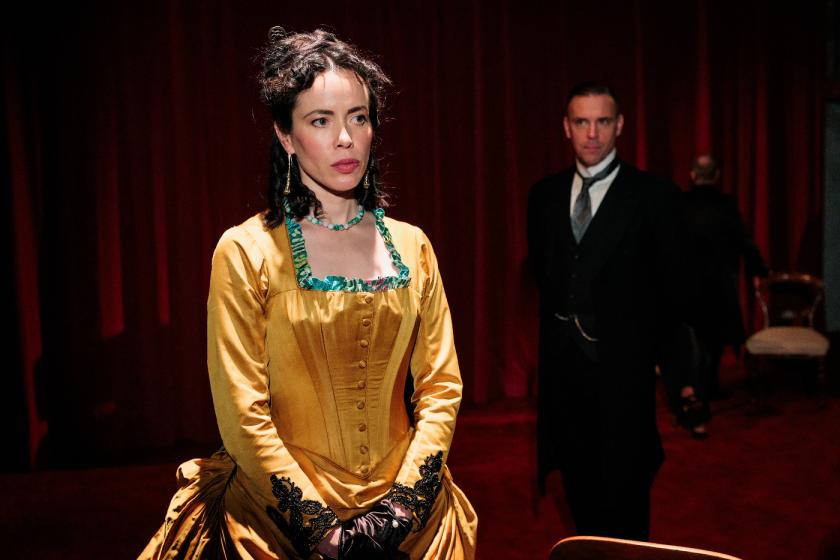The misadventures and misbehaviours of the English upper-middle class is catnip for TV executives. All those posh types on which us hoi polloi can sit in delicious self-righteous judgement, as we marvel at their cut glass accents, well-tailored clothes and ostentatious wealth. Meanwhile their worlds are always collapsing due to villainy, venality or misconceived virtue. Lovely stuff!
While such tales are seldom far from a screen, they are often far from a stage, the challenge of scaling down just too intimidating for most adaptors. Not so Shaun McKenna and Lion Couglan who took on the daddy of them all, reducing (but not much diminishing) The Forsyte Saga at Park Theatre.
Liberties have been taken – some more successful than others – but this material is no Pride and Prejudice or Game of Thrones, John Galsworthy series of novels read far less frequently than those books. Most of the audience will recognise the mise-en-scène, underpinned by Anna Yates’ period costumes, but will not be ticking off character arcs and plot points against their expectations tut-tutting as the play unfolds. The story is more familiar than well known.
 Presented in two parts, each has a suffix which frames the narrative structure, allowing us to see events unfold from the perspective firstly of Irene, and secondly that of her daughter, Fleur, who also takes on the role of narrator in Part One, expediting the exposition essential to get the story going.
Presented in two parts, each has a suffix which frames the narrative structure, allowing us to see events unfold from the perspective firstly of Irene, and secondly that of her daughter, Fleur, who also takes on the role of narrator in Part One, expediting the exposition essential to get the story going.
And what a story it is, located four-square within its late 19th and early 20th century sensibilities but freighted with firecrackers that explode with a 21st century relevance that bring gasps of surprise about how things once were, but also wry smiles and grimaces at how little things have changed really.
Irene, a beautiful woman who knows her mind, is trapped in a loveless marriage with Soames, a lawyer cushioned by the second generation of the wealth acquired by the Forsytes through trade and professions. They’re rich, but with new money not old, and the consequent insecurity runs through the family, forever looking over their shoulders, keeping secrets, continually evaluating people, objects and relationships as if entries on a bookkeeper’s ledger. If all you have to separate yourself from the masses is money, you’d better value it above all else.
Soames is stuck, a perpetually repressed boarding school boy, brimming over with entitlement and an almost pathological need to be loved. He so fears his life’s complications that his only answer is to attempt to control every aspect of it, especially his wife, whose resistance grows at the same speed as her husband’s neuroses. You still see Soameses at every level of industry, the professions and, especially, in politics, us poor bloody infantry still falling for the Eton drawl, the stiff-backed bearing and the superficial confidence, addicted to putting them where they will do the most damage.
There’s a darker thread to Soames’ damaged psyche though. We see clearly what is now called toxic masculinity, as he uses his financial, social and physical power in hopelessly ill-judged attempts to get what he thinks he needs from Irene. His complete lack of emotional intelligence, possibly the product of another concept that was unknown to Galsworthy, neurodivergence, dooms him and resonates down the decades, wave after wave of misery traced back to a man condemned to live in a psychological adolescence all through his life.
Somehow we don’t completely hate him. Joseph Millson (pictured above with Florence Roberts, Jamie Wilkes and Flora Spencer-Longhurst) brings charisma, sensitivity and sympathy to the role, with director, Josh Roche, never allowing even a hint of a moustache-twirling caricature to form in our minds. That’s critical, because we need to know what Irene saw in him and how he keeps this strong, independent, bewitching woman attached to him through everything. Fiona Hampton is splendid as the wife/survivor, so good in fact that her minimal presence in Part Two imbalances the ‘boxed set’ production to its detriment.
The cast, most playing multiple roles, are all excellent (indeed, it’s only the sparse set that reminds us that we’re not at the National Theatre) with Jamie Wilkes a standout playing two husbands who find a way to love difficult women, drawing on all the empathy Soames lacks. Andy Rush is also very good as two dashing young men, one of whom tempts Irene in Part One and the other Fleur in Part Two, but fails to bring happiness to either, Soames pulling strings to ensure their disappointments.
From under a Louise Brooks bob hairstyle and in a fashionable drop waist skirt, Flora Spencer-Longhurst gives Fleur the flair she needs as a 1920s woman in a post World War I society that Soames fails to understand. But Fleur is not Irene and her girlish, lightweight character does not sustain the narrative as successfully as did her father’s ex-wife in Part One. The feuds become more petty, the theme that that past should never determine the present more laboured and the characters less vivid. Whisper it, but it does get ever so slightly soapy.
Nevertheless, this production lives up to its billing as a five hours long saga, providing a broad canvas for a voyeurist's delight in viewing how the other half once lived. But it also reveals plenty about today too, setting a challenge for us all to limit the damage men like Soames Forsyte do to themselves and to their families, compelling us to find ways not just to protect women like Irene, but to develop a society that allows them to grow emotionally and fully realise the women they can be.
The saga continues behind the closed doors of many homes and workplaces, even today.















Add comment